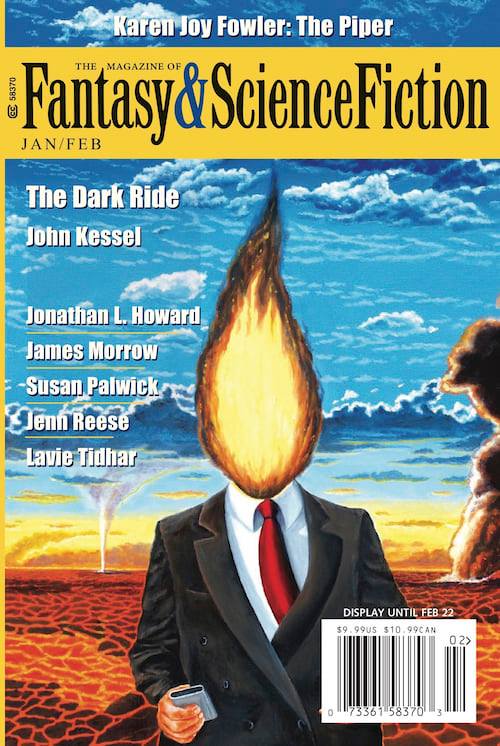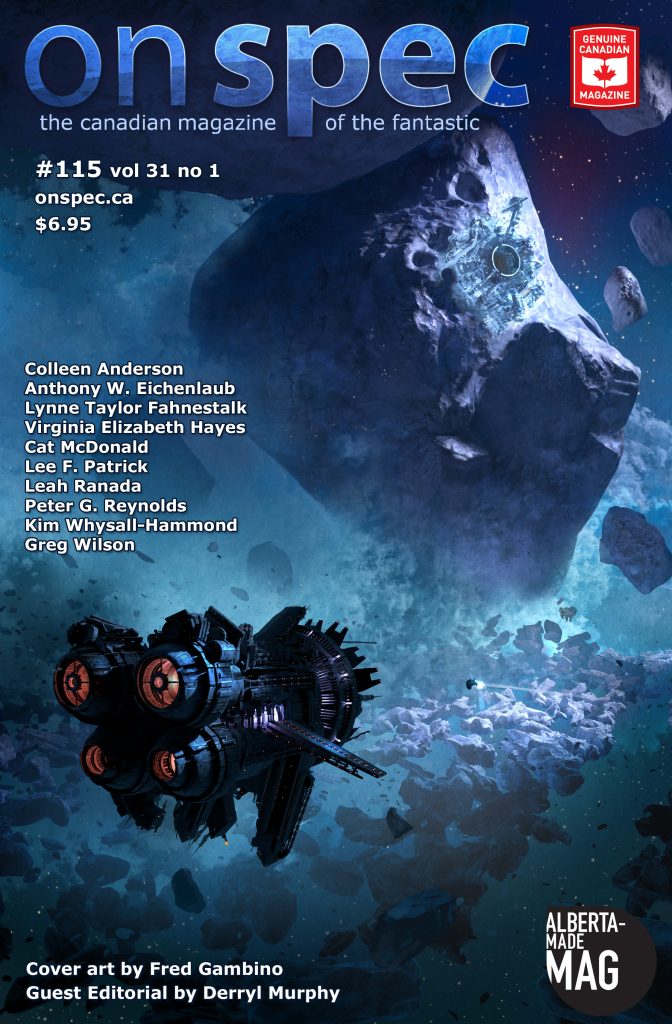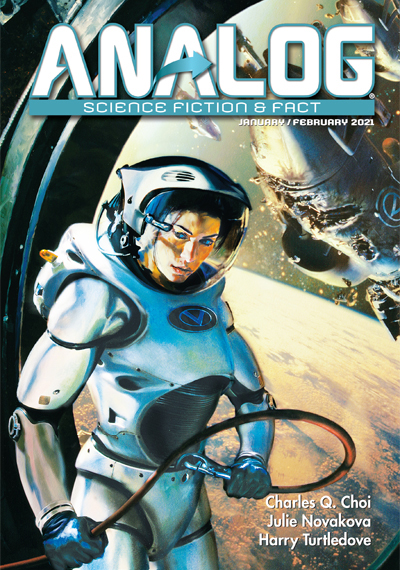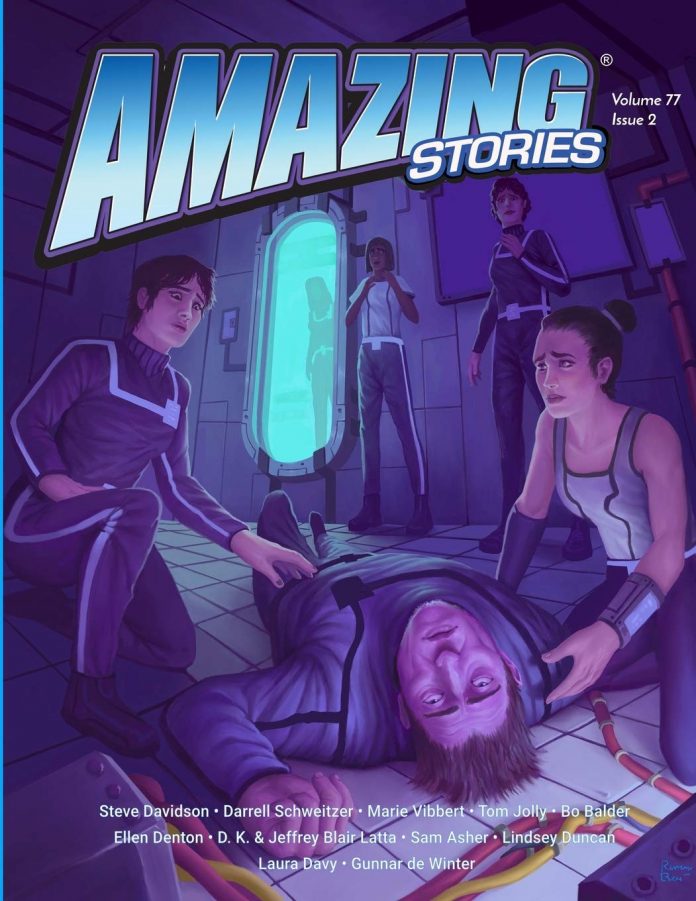Details
Past Editor: C.C. Finlay Current Editor: Sheree Renee Thomas Pay: 8-12 cents per word Word range: flash to 25,000 Simultaneous submissions? No Reprints? No
Description
When it comes to helpful rejection letters, fast turnaround times, and a high-quality product, this is my favorite place to submit stories. The Magazine of Fantasy & Science Fiction is a Science Fiction & Fantasy Writers of America (SFWA) qualifying market based out of the United States. Founded in 1949, they produce six print issues a year. They are the original publishers of science fiction classics like Stephen King’s “Dark Tower” and Daniel Keyes’s “Flowers for Algernon”. I’ve sent them 14 stories and received a rejection for all of them. However, five of the rejection letters included detailed reasons why C.C. Finlay did not accept them. “The Last Ride,” “Camp Napanoo,” “The Versa Vice,” “The Writing Retreat,” and “The Patron Saint of Livestock,” all came back with thoughtful notes that helped me rewrite each tale and sell them to other markets. The new (and 10th) editor for 2021, Sheree Renee Thomas, is an award-winning Pushcart-nominated author. Her work is inspired by myth, folklore, and natural science. I look forward to reading her rejections and cross my fingers there may be an acceptance eventually. The Magazine of Fantasy & Science Fiction is frequently open to submissions and only close when they need to get on top of their slush pile.
Submission Hints
According to the writer’s guidelines: “Submissions have increased more than 10% this year, compared to last, and you aren't just sending us more stories, you're sending us more really excellent stories. That is one of the few good things we'll say about 2020. Give us this chance to go through them.” Another plus to this market is the rapid turnaround. I never had to wait more than two weeks to get my “nay.” However, the guidelines do ask for writers to allow eight weeks for a response. Fun fact: C.C. Finlay is active on twitter and posts cool pictures of his cat. @ccfinlay
Sample Rejection
“Thank you for giving me a chance to read "The Museum of the Lost People." This always feels like it's on the edge of turning into a hot urban fantasy romance to me… which is great, and I think this shows a lot of natural talent in that direction, which I mention only because I have several friends who do pretty well writing (sometimes traditional publishing, sometimes self-publishing) urban fantasy, if that's not something you're already doing. Even though I liked the ending, I kept wanting the narrator to take more initiative earlier in the story I understand that holding is part of what creates the tension and drives the story, but it didn't work as well for me as I thought it needed to. In the end, this story didn't quite win me over for Fantasy & Science Fiction and I'm going to have to pass. But I thought the writing was good -- I wish you best of luck finding the right market for it and hope that you'll keep us in mind again in the future.” “The Museum of the Lost People” is still looking for a home, but I gave it a rewrite giving the protagonist more initiative and adding more of a romantic angle.
Fantasy & Science Fiction
Clarkesworld
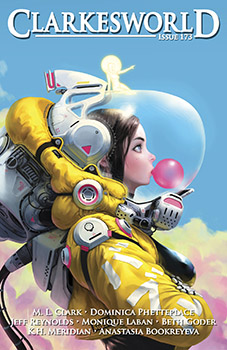
Details
Publisher/Editor: Neil Clarke Pay: 10 cents per word Word range: 1,000 - 22,000 Simultaneous submissions? No Reprints? No
Description
Clarkesworld is an award-winning science fiction and fantasy magazine. A SFWA-qualifying market, it was first published in 2006 and is one of the top places speculative fiction writers want to see their work. It comes out monthly, and contains interviews, stories, and articles. They accept stories from all over the world and say translations are welcome. They also have a podcast which features a story from the current issue.
Submission Hints
The submission guidelines state: “Science fiction need not be “hard” SF, but rigor is appreciated. Fantasy can be folkloric, contemporary, surreal, etc. That said, there are some things that we’ve grown tired of and can be difficult or impossible to sell to us: (this is not a challenge) • stories that include zombies or zombie-wannabes • stories about sexy vampires, wanton werewolves, wicked witches, or demonic children • stories about rapists, murderers, child abusers, or cannibals • stories where the climax is dependent on the spilling of intestines • stories in which a milquetoast civilian government is depicted as the sole obstacle to either catching some depraved criminal or to an uncomplicated military victory • stories where the Republicans, or Democrats, or Libertarians, or . . . (insert any established political party or religion here) take over the world and either save or ruin it • stories in which the words “thou” or “thine” appear • stories with talking cats or swords • stories where FTL travel or time travel is as easy as is it on television shows or movies • stories about young kids playing in some field and discovering ANYTHING. (a body, an alien craft, Excalibur, ANYTHING). • stories about the stuff you just read in Scientific American or saw on the news • stories about your RPG character’s adventures • “funny” stories that depend on, or even include, puns • stories where the protagonist is either widely despised or widely admired simply because he or she is just so smart and/or strange • stories originally intended for someone’s upcoming theme anthology or issue (everyone is sending those out, wait a while) • your trunk stories • stories that try to include all of the above”
Sample Rejection
“Thank you for the opportunity to read "The Metamorphosis." Unfortunately, your story isn't quite what we're looking for right now. In the past, we've provided detailed feedback on our rejections, but I'm afraid that due to time considerations, we're no longer able to offer that service. I appreciate your interest in Clarkesworld Magazine and hope that you'll keep us in mind in the future.”
Fantasy & Science Fiction
uncanny
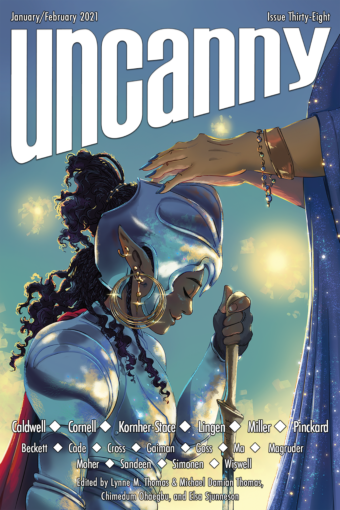
Details
Submissions Editor: Brahidaliz Martinez Pay: 10 cents per word Word range: 750-6,000 Simultaneous submissions? Yes Reprints? No
Description
Uncanny magazine specializes in stories that make you feel. Classifying itself as an on-line/eBook/podcast SF/F magazine, their cover art is breathtaking. It has won multiple Hugo Awards, a Parsec Award, and a British Fantasy Award. The two Editors-in-Chief; Lynne M. Thomas, and Michael Damian Thomas, have also won several Hugo Awards. It is a SFWA-qualified market. From the website: “Uncanny Magazine is an online Science Fiction and Fantasy magazine featuring passionate SF/F fiction and poetry, gorgeous prose, provocative nonfiction, and a deep investment in the diverse SF/F culture. Each issue contains intricate, experimental stories and poems with verve and imagination that elicit strong emotions and challenge beliefs, from writers of every conceivable background. Uncanny believes there’s still plenty of room in the genre for tales that make you feel.”
Submission Hints
Lynne M. Thomas (co-publisher & editor-in-chief) said in a reddit interview: “For me it's not necessarily about a kind of story, it's about how the kind of story is executed. I'm interested in stories that are inclusive of the gamut of the human experience, and I want to see a bit more whimsy.”
Sample Rejection
“Thank you for submitting “The Patron Saint of Livestock” to Uncanny Magazine for consideration. Unfortunately, we’re going to pass on this one. It just didn’t work for us. We look forward to reading further submissions from you.”
Science Fiction
Asimov's science fiction
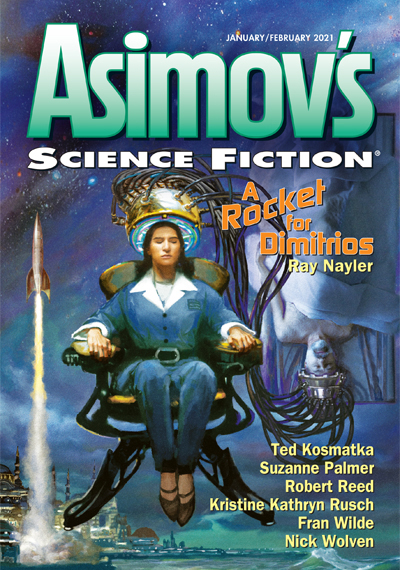
Details
Editor: Sheila Williams Pay: 8-10 cents per word Word range: 1,000-20,000 Simultaneous submissions? No Reprints? No
Description
Asimov’s Science Fiction Magazine is a powerhouse in the science fiction world and was founded in 1977 by Joel Davis and Isaac Asimov. This publication is part of the Dell Magazine family and SFWA-qualified. Personally, I adore Isaac Asimov’s anthologies of short stories, especially his “Robot” series. Their website asks: Have you ever wondered where George R. R. Martin’s Daenerys Targaryen first appeared on the printed page? Where Kim Stanly Robinson first staked his claim on “Green Mars”? Who first published Octavia E. Butler’s Hugo and Nebula Award winning short fiction? What magazine was home to the first professional fiction publications of Jonathan Lethem, Kelly Link, and Allen M. Steele? Asimov's Science Fiction Magazine, of course!”
Submission Hints
They have a very specific request for content: “In general, we’re looking for “character oriented” stories, those in which the characters, rather than the science, provide the main focus for the reader’s interest. Serious, thoughtful, yet accessible fiction will constitute the majority of our purchases, but there’s always room for the humorous as well. SF dominates the fiction published in the magazine, but we also publish borderline fantasy, slipstream, and surreal fiction. No sword & Sorcery, please. Neither are we interested in explicit sex or violence. A good overview would be to consider that all fiction is written to examine or illuminate some aspect of human existence, but that in science fiction the backdrop you work against is the size of the Universe.”
Sample Rejection
Asimov’s has a form letter they send out for rejections, and I’ve gotten six of them. I once got a tiny note from Sheila Williams herself at the end of one. I heard her give a lecture on the Odyssey Writing Workshop Podcast, and loved it, so I put a comment referencing how much I enjoyed it in one of my submissions. “Thank you very much for letting us see "Shafted." We appreciate your taking the time to send it in for our consideration. Although it does not suit the needs of the magazine at this time, we wish you luck with placing it elsewhere. Thanks for your kind comments about my podcast. Good to know that someone found it.”
Fantasy & Science Fiction
unreal/unfit
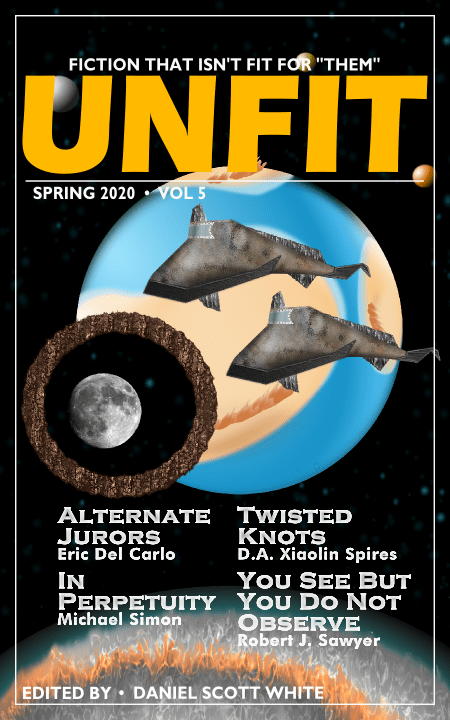
Details
Editor: Daniel White Scott Pay: 25 cents per word for the first 1,000 1 cent per afterwards Word range: under 10,000 Simultaneous submissions? Yes
Description
These two magazines are imprints owned by Longshot Press and some of the highest paying in genre fiction. They are proudly not a part of the Science Fiction & Fantasy Writers of America (SFWA) organization. Unfit Magazine is a pulp fiction style science fiction magazine with the tag line: “Fiction that isn’t fit for ‘them’! Toxic content. (Keep it secret!) We run with scissors. Banned by your Mother.” Unreal Magazine is also a pulp fiction style magazine focusing on fantasy. The tag line is: Let the magic take you away! Fiction that isn’t made for this world. So, let go. Get unreal for a moment.”
Submission Hints
The submission pages suggest: “We want stories that are well written, intelligent, and enjoyable to read. We are looking for stories with metaphors and emotional ambiance and imaginative descriptive writing. Most importantly, we want original ideas.”
Sample Rejection
If you don't hear back from these magazines, you can assume your story wasn't picked up.
Science Fiction, Fantasy & Horror
diabolical plots

Details
Editor: David Steffen Pay: 10 cents per word Word range: max 3,500 Simultaneous submissions? No Reprints? No
Description
Diabolical Plots is a SWFA-qualifying market that buys speculative fiction that leans towards startling, odd, and interesting. If you have a character-driven story with a strong inner and outer arc, this maybe a good place to submit.
Submission Hints
The editor, David Steffen, advises writers to be wary of being wordy. Tight concise prose that gives you everything you need to understand the story without overstaying its welcome, relatable characters, cool speculative ideas, all written very tightly. You don’t have many words, there is no space to waste.” The website says they are looking for: “Speculative fiction–science fiction, fantasy, and horror. Everything should have a speculative element–that includes horror. Feel free to mix in other genres at will–a fantasy mystery or a science fiction romance. And yes, we really mean it has to have a speculative element. If you submit a serial killer story with only mundane elements, even though that could be a horror story it’s not a speculative horror story and it will be rejected regardless of quality. • Things that we tend to really like: • Weird fiction • Sense of wonder • Strong character and plot arcs • Strong world-building, hinting at more to see around the edges of the story • Philosophical food-for-thought • Straightforward, easily readable style • Religion, where the story does not try to convert the reader, nor does the story demonize religion • Platonic friendship between men and women”
Sample Rejection
“Thank you for allowing us to read your story, "The Patron Saint of Livestock". Unfortunately, we are not accepting your story. Please excuse this form letter. It is not a reflection on your submission--we would love to give personal responses to every submission, but can only afford to do so for a small subset to keep response times down. (Reading on mobile devices has helped keep response times short, but the slowness of touch-screen typing makes personal notes more difficult).”
Details
Managing Editor: Diane Walton Pay: $100 for under 1,000 word Sliding scale up to $200 Word range: up to 6,000 Simultaneous submissions? Yes
Description
On Spec publishes innovative poetry and short stories. They call themselves: The Canadian Magazine of the Fantastic” The editors ask for character-driven pieces with high stakes that keep readers turning the pages. From the website: “Our little quarterly journal, On Spec adheres to a strong mandate that has served us well over the years. We discover and showcase quality works by predominantly Canadian writers and artists, in the genre we call “Fantastic” literature. We foster the growth of emerging writers in this genre, by offering support and direction through constructive criticism, education, mentoring, and manuscript development. We try to publish as many new writers as possible, alongside works by established writers, and we also endeavour to support these writings with innovative cover art for every mind-bending and emotion-provoking issue!”
Submission Hints
Here are some hints for selling to this market: • Watch out for flags that predict the ending of the story before we get to it. • Don’t send us a HAITE story. That’s our acronym for “Here’s An Idea: The End”. • Watch out for surprise Twist endings, especially if you have hidden a key piece of information from the Reader until the deus ex machina ending happens. The same applies to “one joke” or “Shaggy dog” endings. • Make sure your story gives the reader a credible reason to willingly suspend their disbelief, and always make the ending of your story believable. The last thing we want to see is “It was all a dream”, or “we’re all living inside a snow globe”, or “this was all VR”. • Stay away from really awful protagonists. Remember the point above where we want the reader to be engaged with the protagonist and really care about the outcome.”
Sample Rejection
“We are sorry to inform you that your Work entitled Quiver does not meet our needs. Thank you for giving us an opportunity to read it. The editors may have included some comments on your work which may be useful. Comments can be seen below. Keep in mind this is only the opinion of one magazine. We wish you the best in your future writing career, and hope to see more of your work. Please do not reply to this email notice. First, two comments: Look up the verbs "to lie" and "to lay," and next, please set up your manuscript so that there is not an extra space between paragraphs. Thank you. This is an interesting premise but the execution needs work. The twist that Seth was not the killer was a nice device and worked very well, sending the story in an unexpected direction. However, there were numerous grammatical and punctuation errors, along with awkward phrasing that detracted from the story.”
Details
Editor-in-chief: Vanessa Rose Phin Pay: 10 cents per word Word range: up to 5,000 Simultaneous submissions? No Reprints? No
Description
Strange Horizons defines itself as a weekly magazine of and about speculative fiction. Launched in September 2000, it is a SWFA-qualifying market. The staff volunteering on this magazine come from all over the world including Sri Lanka, India, Brazil, Canada, China, and the USA. From the website: “We publish fiction, poetry, reviews, essays, interviews, roundtable discussions, and art. Our definition of speculative fiction includes science fiction, fantasy, horror, slipstream, and all other flavors of fantastika.
Submission Hints
They specify what kind of fiction they are looking for: • Fiction from or about diverse perspectives and traditionally under-represented groups, settings, and cultures, written from a non-exoticizing and well-researched position. • Unusual yet readable styles and inventive structures and narratives. • Stories that address political issues in complex and nuanced ways, resisting oversimplification. • Hypertext fiction, interactive fiction, and other stories that explore and exploit the forms available to us. If you have a work of this type that you think might be a good fit for Strange Horizons, please query us to discuss how to submit it.”
Sample Rejection
“Thank you for submitting "Farmyard Follies" to Strange Horizons, and apologies for the delay in responding! We appreciate the chance to read your work but unfortunately this piece didn't quite work for us. We wish you the best in placing it elsewhere. We appreciate your interest in our magazine.”
Details
Editor: Trevor Quachi Pay: 8-10 cents per word Word range: up to 20,000 Simultaneous submissions? No Reprints? No
Description
This is another founding magazine and big player in the science fiction world owned by Dell Magazines. Analog Science Fiction and Fact Magazine was originally published as Astounding Stories of Science Fiction when it launched in 1930. Analog was where Anne McCaffrey’s dragons first took flight! There were three issues from 1967 and 1968 which have the first three novellas in McCaffrey’s Dragonriders of Pern series. Frank Herbert’s sprawling epic Dune also originally appeared in Analog. After being serialized in the magazine, Dune was rejected 23 times before it was eventually picked up by Chilton Books. Dune has been called the best-selling science fiction novel of all time.
Submission Hints
Editor Trevor Quachri says: “Analog/Astounding is often considered the magazine where science fiction grew up. When Editor John W. Campbell took over in 1938, he brought to Astounding an unprecedented insistence on placing equal emphasis on both words of "science fiction." No longer satisfied with gadgetry and action per se, Campbell demanded that his writers try to think out how science and technology might really develop in the future – and, most importantly, how those changes would affect the lives of human beings. The new sophistication soon made Astounding the undisputed leader in the field, and Campbell began to think the old title was too "sensational" to reflect what the magazine was actually doing. He chose "Analog" in part because he thought of each story as an "analog simulation" of a possible future, and in part because of the close analogy he saw between the imagined science in the stories he was publishing and the real science being done in laboratories around the world. Real science and technology have always been important in Analog, not only as the foundation of its fiction, but as the subject of articles about real research with big implications for the future. One story published during World War II described an atomic bomb so accurately – before Hiroshima – that FBI agents visited John Campbell to find out where the leak was. (There was no leak – just attentive, forward-thinking writers!)”
Sample Rejection
“Thank you very much for letting me see "The Corp." I'm sorry it didn't strike me as quite suitable to our present needs.”
Details
Managing Editor: Ira Nayman Pay: 8 cents per word Word range: 1,000 -10,000 Reprints? No Simultaneous submissions? No
Description
Amazing Stories has been around for a long time. In fact, it credits itself as the very first science fiction magazine started in 1926 by Hugo Gernsback. Stephen King talks about receiving rejections from this publication at the beginning of his career. The website chronicles what Amazing Stories has done lately: The field of science fiction (or scientifiction as Gernsback originally called it) has changed substantially in the ninety years since Amazing Stories was first published. For one thing, science has progressed substantially, giving us men on the moon, a map of the human genome, virtual reality, the Internet of things, and real robots and artificial intelligence; never before have science fiction writers had so many toys to play with, and new ones seem to be appearing every day. For another thing, science fiction readers are more sophisticated than they were an almost century ago; they’ve been there and done that with the formulae of the genre, and they’re looking for what’s next. Amazing Stories hopes to be what’s next.”
Submission Hints
The guidelines say: “Amazing Stories is looking for short stories that are fresh and new. We want to be surprised. We want to be delighted. We want your stories to be amazing. It’s not enough to be technically proficient and have a sort of, somewhat semi-original idea; we want to be dazzled by your original style and substance. Remember when science fiction was optimistic, when the future was something to be embraced as a bold adventure instead of a place of dystopias, seemingly endless wars and mutant monstrosities to be feared? Amazing Stories will not shy away from stories that explore the negative impacts of technologies on individuals and society, but we have a strong preference for stories that take a bright view of human ingenuity and the possible futures we can make with it. Have you ever read a short story or novel and thought to yourself, “I want to take part in making that future a reality?” That is what we would like to see. We intend to have a balance of relatively known and relatively new writers. Don’t be reluctant to submit stories just because you aren’t a famous writer – if you have an original idea and style, submitting to Amazing Stories could be your first step to becoming one. We are happy to consider stories with a strong point of view, especially in light of the fact that one of the strengths of science fiction is its exploration of how science and technology can change interpersonal relationships and politics. However, we do not want stories that are basically political screeds or other kinds of preaching. The point of view needs to arise naturally out of the workings of the plot and the interactions of the characters.”
Sample Rejection
“Thank you for submitting your story "The Attack of the Leech People" to Amazing Stories. Unfortunately, it is not what we are looking for at this time. Best of luck with your future writing.”
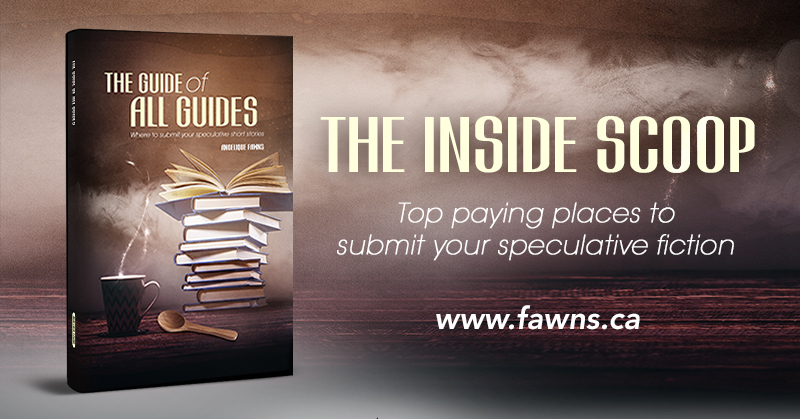
like this list? get more free.
This was a sample of what you can find in The Guide of All Guides. GET IT FREE NOW from you favorite ebook retailer.
https://books2read.com/TheGuideofallGuides

